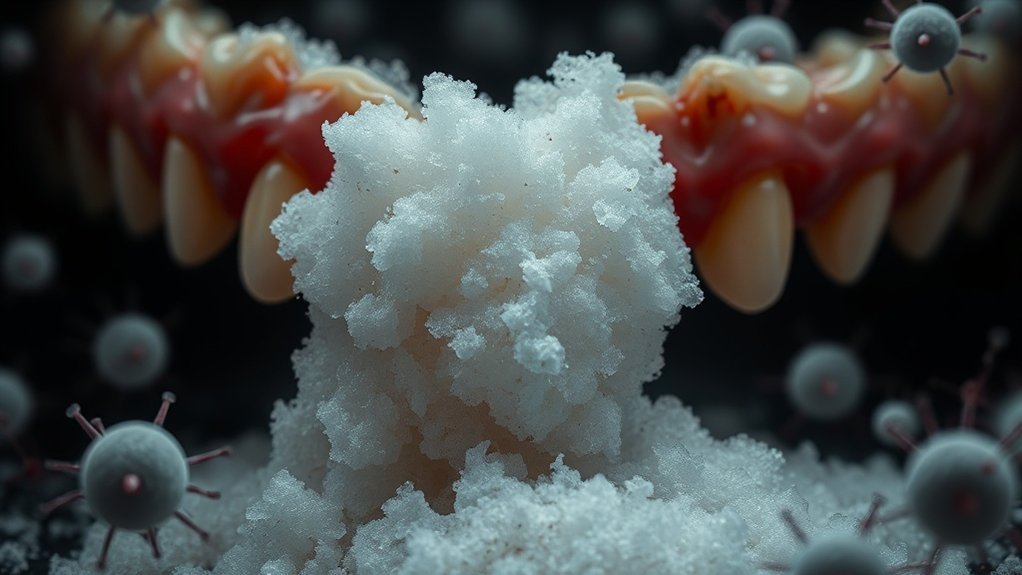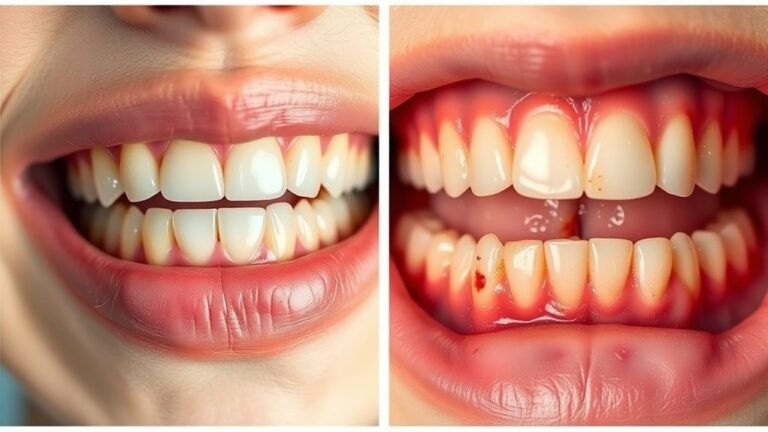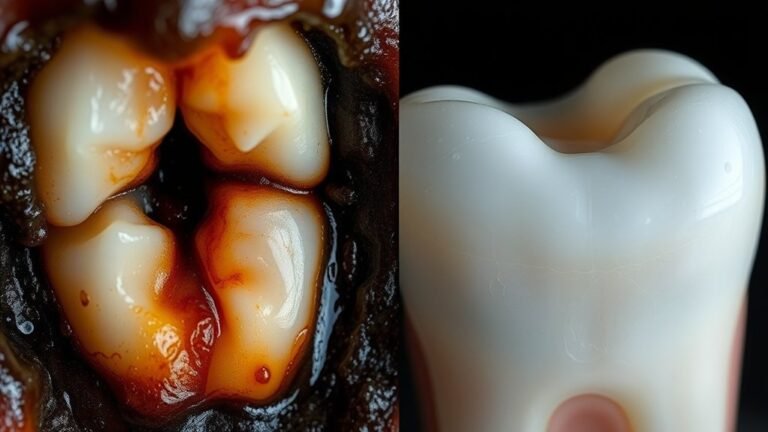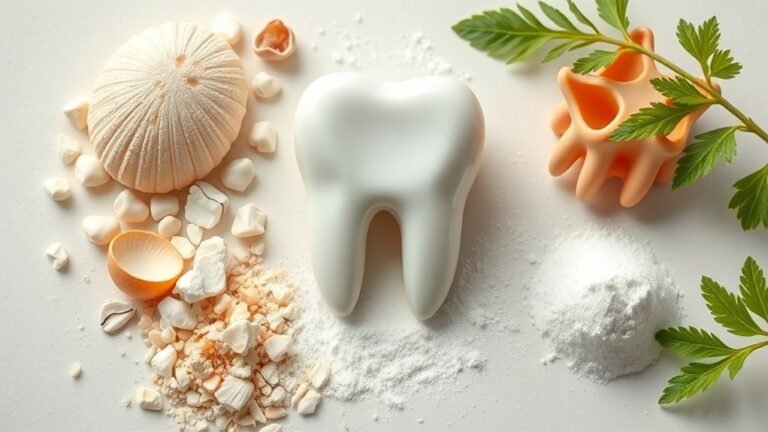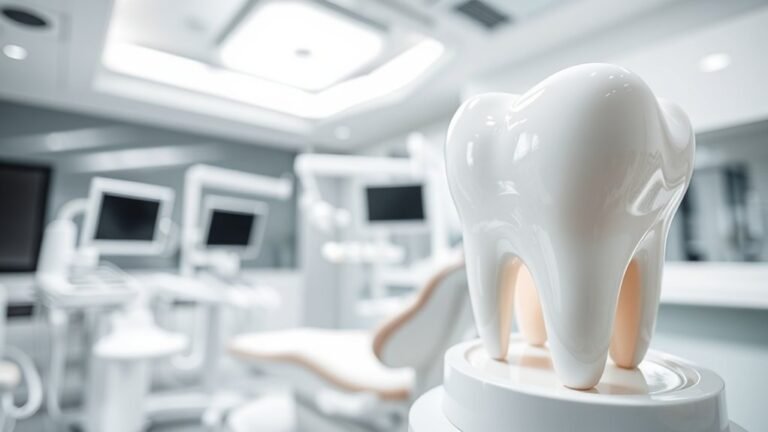How Does Sugar Intake Disrupt the Oral Microbiome and Cause Infections
High sugar intake disrupts your oral microbiome by boosting harmful bacteria that thrive on sugar, leading to biofilm formation and infections like cavities and gum disease. Sugar increases acid production, which erodes tooth enamel and creates an acidic environment, favoring pathogenic microorganisms over beneficial ones. This imbalance can aggravate oral health issues and compromise your immune response. Understanding these dynamics is key to maintaining a healthy mouth, and more insights await as you explore further.
Key Takeaways
- High sugar intake increases acid production, eroding tooth enamel and fostering the growth of harmful bacteria in the oral microbiome.
- Sugar serves as a primary energy source for pathogenic bacteria, promoting their growth and leading to biofilm formation that protects them.
- Mature biofilms formed by harmful bacteria can result in infections like dental caries and periodontitis, compromising oral health.
- Excessive sugar consumption reduces populations of beneficial microbes, destabilizing the oral microbiome and enabling harmful bacteria to proliferate.
- A balanced diet and reduced sugar intake are essential for maintaining oral microbiome health and preventing chronic oral infections.
Understanding the Oral Microbiome
The oral microbiome is a complex community of microorganisms that plays an essential role in your overall health. It maintains a delicate balance, supporting immune function and preventing harmful bacterial overgrowth. However, high sugar intake can lead to oral microbiome disruption. When you consume excessive sugar, it feeds pathogenic bacteria, allowing them to thrive and outcompete beneficial microbes. This imbalance can result in various oral health issues, including cavities and gum disease. Studies show that sugar acts as a substrate for harmful bacteria, exacerbating their growth and contributing to inflammation. By understanding these dynamics, you can make informed dietary choices that support a healthy oral microbiome and mitigate the risks associated with bacterial overgrowth.
The Role of Sugar in Oral Health
While indulging in sugary treats might seem harmless, it heavily impacts your oral health. The consumption of sugar, particularly fermentable carbohydrates, fuels acidogenic bacteria in your mouth, leading to detrimental effects. Here’s how sugar plays a necessary role in your oral health:
- Dental Caries Formation: Sugar consumption increases acid production, eroding tooth enamel and contributing to cavities.
- Bacterial Imbalance: High sugar intake fosters an environment for harmful bacteria, disrupting your oral microbiome balance.
- Increased Plaque Development: Sugar promotes plaque buildup, which can lead to gum disease if not managed properly.
Understanding the role of sugar in oral health is essential for maintaining a healthy smile and preventing infections. Reducing sugar intake can greatly improve your oral microbiome and overall dental well-being.
How Sugar Fuels Harmful Bacteria
When you consume sugar, it directly influences the growth of harmful bacteria in your mouth, creating an environment conducive to oral health issues. Sugar acts as a primary energy source for these bacteria, allowing them to thrive and multiply. This proliferation leads to biofilm formation, where bacterial colonies adhere to tooth surfaces, creating a protective layer that shields them from your immune response and dental hygiene efforts. As the biofilm matures, it can result in infections like dental caries and periodontitis. The acidic byproducts of sugar metabolism further erode tooth enamel, exacerbating the problem. Consequently, reducing sugar intake is essential to control harmful bacteria, maintain a balanced oral microbiome, and prevent infections that can lead to severe oral health complications.
The Impact of Sugar on Beneficial Microbes
Although sugar is often criticized for its effects on harmful bacteria, its impact on beneficial microbes in the oral microbiome is equally significant. When you consume sugar, it can alter the balance of these beneficial microbes, leading to detrimental effects. Here’s how sugar affects them:
- Nutrient Competition: Sugar can provide a competitive advantage to harmful bacteria, overshadowing beneficial ones and reducing their populations.
- Metabolic Changes: Beneficial microbes rely on a stable environment; sugar can cause fluctuations in pH and metabolic processes that harm their survival.
- Biofilm Disruption: Sugar intake can destabilize the biofilm where beneficial microbes thrive, making it easier for harmful bacteria to proliferate.
Maintaining a balanced diet is essential to support your oral health and the beneficial microbes that protect it.
The Connection Between Sugar and Gum Disease
Sugar not only disrupts beneficial microbes but also plays a significant role in the development of gum disease. When you consume sugar, it fosters the growth of harmful bacteria that thrive in your mouth, leading to inflammation and infection. This imbalance can result in gum disease, which may escalate to more severe conditions if left untreated.
| Effect of Sugar | Type of Bacteria | Resulting Condition |
|---|---|---|
| Increases plaque | Porphyromonas gingivalis | Gingivitis |
| Promotes inflammation | Fusobacterium nucleatum | Periodontitis |
| Depletes beneficial bacteria | Streptococcus mitis | Oral dysbiosis |
| Weakens gum tissue | Aggregatibacter actinomycetemcomitans | Tooth loss |
Understanding this connection can help you make informed dietary choices to protect your oral health.
Tooth Decay: The Sugar-Microbiome Link
Tooth decay, a common dental issue, arises from the complex interplay between sugar consumption and the oral microbiome. When you consume sugar, certain bacteria in your mouth thrive, leading to an imbalance that promotes decay. Here’s how sugar impacts your oral health:
Tooth decay results from sugar consumption’s effect on harmful bacteria, disrupting the balance of your oral microbiome.
- Bacterial Growth: Sugars feed harmful bacteria like Streptococcus mutans, increasing their population and acid production.
- Acid Production: The acids produced by these bacteria erode tooth enamel, creating cavities.
- Microbiome Disruption: A high-sugar diet disrupts the natural balance of your oral microbiome, favoring pathogenic bacteria over beneficial ones.
Being aware of this link helps you understand the importance of moderating sugar intake to maintain a healthier mouth and prevent decay.
Strategies to Maintain a Healthy Oral Microbiome
Maintaining a healthy oral microbiome is essential for preventing dental issues and promoting overall oral health. To support this balance, prioritize regular dental hygiene practices, including brushing twice a day and flossing daily. These actions reduce plaque buildup, limiting harmful bacteria growth.
Incorporate probiotics, such as yogurt or fermented foods, into your diet; they can help maintain beneficial bacteria levels. Additionally, stay hydrated, as saliva plays an important role in controlling microbial populations.
Avoid excessive sugar intake, since it fosters pathogenic bacteria. Finally, consider using antimicrobial mouthwashes, but do so sparingly to avoid disrupting beneficial microbes. By adopting these strategies, you can fortify your oral microbiome and mitigate the risk of infections and dental complications.
The Importance of a Balanced Diet for Oral Health
A balanced diet plays a critical role in maintaining your oral health by providing essential nutrients that support the integrity of your teeth and gums. Hydration is equally important, as it helps wash away food particles and bacteria, reducing the risk of decay. On the other hand, excessive processed sugars can disrupt your oral microbiome, leading to potential dental issues.
Nutrient-Rich Foods Matter
While many people focus on sugar intake as the primary factor affecting oral health, nutrient-rich foods play an equally important role in maintaining a balanced diet that supports the oral microbiome. Consuming a variety of vitamins and minerals helps strengthen your immune system and promotes healthy bacteria in your mouth. Here are three essential nutrient-rich foods to include in your diet:
- Leafy Greens: Rich in vitamins A, C, and K, they help fight inflammation and support gum health.
- Nuts and Seeds: Packed with healthy fats and minerals like zinc, they promote healing and reduce bacteria.
- Fruits: High in antioxidants and water content, they balance acidity and hydrate your mouth.
Incorporating these foods can remarkably enhance your oral health and overall well-being.
Role of Hydration
Hydration plays a critical role in maintaining oral health, as it directly impacts the balance of the oral microbiome. When you’re adequately hydrated, saliva production increases, which helps wash away food particles and neutralize harmful acids. Saliva also contains antimicrobial properties that inhibit pathogenic bacteria growth, promoting a healthier oral environment. Conversely, dehydration can lead to dry mouth, creating an ideal setting for harmful bacteria to thrive, ultimately increasing the risk of infections and cavities. Additionally, drinking water aids in the absorption of essential nutrients, further supporting your oral health. To maintain a balanced microbiome, guarantee you’re consuming enough fluids daily, emphasizing water over sugary beverages that can exacerbate imbalance and promote harmful bacteria.
Impact of Processed Sugars
Maintaining a balanced diet is essential for oral health, especially regarding processed sugars. These sugars can greatly disrupt your oral microbiome, leading to infections and dental issues. Here are three key impacts of processed sugars:
- Increased Bacterial Growth: Processed sugars feed harmful bacteria, causing them to proliferate and outnumber beneficial microbes.
- pH Imbalance: High sugar consumption lowers oral pH, creating an acidic environment that promotes tooth decay and gum disease.
- Inflammation: Excessive sugar intake can trigger inflammatory responses, further compromising your oral health and leading to chronic conditions.
Frequently Asked Questions
Can Sugar Intake Affect Bad Breath?
Yes, sugar intake can affect bad breath. When you consume sugar, it fuels harmful bacteria in your mouth, leading to increased plaque buildup and foul odors. Maintaining a balanced diet helps reduce these effects effectively.
How Does Stress Influence Sugar Cravings and Oral Health?
When stress hits, you might crave sugary snacks, like a sweet escape from chaos. This can lead to poor oral health, as sugar feeds harmful bacteria, increasing the risk of cavities and gum disease.
Are Artificial Sweeteners Harmful to the Oral Microbiome?
Artificial sweeteners aren’t inherently harmful to your oral microbiome, but their effects can vary. Some studies suggest they may alter microbial balance, potentially leading to negative outcomes. Monitoring your overall diet is vital for oral health.
How Does Hydration Impact Sugar’s Effects on Oral Health?
Hydration helps dilute sugars in your mouth, reducing their potential damage. When you’re well-hydrated, saliva production increases, enhancing its ability to wash away sugar and neutralize acids, ultimately promoting better oral health and microbiome balance.
What Role Does Genetics Play in Sugar Sensitivity and Oral Infections?
Genetics notably influences your sugar sensitivity and susceptibility to oral infections. While some might process sugar efficiently, others may struggle, leading to imbalances in oral bacteria that heighten infection risks, demonstrating the complex interplay between genetics and oral health.
Conclusion
Ultimately, your sugar intake greatly impacts your oral microbiome, promoting harmful bacteria that lead to infections and diseases. Did you know that nearly 90% of adults have experienced tooth decay at some point? This statistic underscores the importance of managing sugar consumption to protect your oral health. By prioritizing a balanced diet and reducing sugar, you can support beneficial microbes and maintain a healthier mouth, ultimately reducing your risk of gum disease and cavities.
